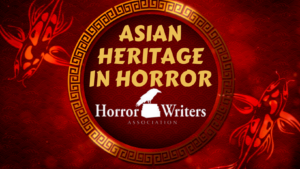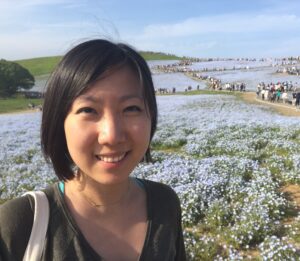Asian Heritage in Horror: Interview with Angela Liu


Angela Liu is a Chinese American writer from NYC. She studied East Asian Studies at New York University and researched mixed reality at Keio University’s Graduate School of Media Design in Japan, with a focus on new narrative platforms and tangible interfaces for remote communication. She now works in IT consulting and Japanese-to-English translation while raising a monster-obsessed toddler. Her stories and poetry are published/forthcoming in Strange Horizons, The Dark, Nightmare Magazine, Clarkesworld, Cast of Wonders, Fusion Fragment, and Dark Matter Magazine among others. Check out more of her work at liu-angela.com or find her on Twitter/Instagram: @liu_angela
What inspired you to start writing?
Growing up, both my parents worked full-time, so I spent a lot of time at home alone. Writing was the one thing I could do on my own that let me escape. I never even thought of writing as something to show people until a very kind English teacher during high school liked an essay I wrote for class and encouraged me to enter a few writing contests. I didn’t win any of them (no surprise), but I remember being invited to the winners’ ceremony, and my parents got to go, too. It was the first time anyone in our family had been to an “awards” ceremony. I only got a participation pin, but it didn’t matter—I don’t think I’ve ever seen them more proud of anything I ever did. I think that was the first time I thought MAYBE, I could write for more than just myself.
What was it about the horror genre that drew you to it?
I don’t know if it sounds bad, but I find there’s a unique satisfaction in writing horror that you can’t find in any other genre. I write a lot of SFF stories and nonfiction as well, but I always end up coming back to horror because of that feeling. I think there’s a brutal honesty allowed in horror that doesn’t always feel as present in other speculative genres. There are few heroes and more madness. The characters usually have little power over what happens to them. Happy endings are twisted in some inherent way and the world itself, more often than not, doesn’t care if the characters succeed. To me, this all feels far closer to reality. In this sense, when I write horror, I feel more empowered because I’ve flipped the roles and put myself in control of the cruel world.
Do you make a conscious effort to include Asian and/or Pacific Islander characters and themes in your writing and if so, what do you want to portray?
My main characters are almost always Asian, but this is less a conscious effort than just a matter of writing what I know—the stories I grew up with, the things I’ve seen, the conversations I’ve had, the people I spend my day-to-day life with. I love putting in yokai and remixed versions of scary folktales/urban legends I heard growing up. In the same way, I absolutely love seeing warped versions of things I recognize or loved as a kid when I read other Asian authors’ writing. It almost feels like an unspoken greeting in the story from the author, a kind of unexpected connection.
What has writing horror taught you about the world and yourself?
I’m a pretty squeamish person in real-life and embarrassingly easy to scare—I can’t even go to the bathroom alone at night after reading some of the stuff on Creepy Pasta. So I was surprised by how easy it was to write the most terrifying and horrific things on the page. I find that writing horror lets me explore my worst fears from a safe distance. And it’s not just the graphic horror. Themes of abandonment, bullying, extreme parental pressure, and loss of memory and identity are all horror topics that I can make better sense of when I work through them in my own writing.
Then there’s the old cliché that always proves true: that life can be so much more horrific than fiction.
How have you seen the horror genre change over the years? And how do you think it will continue to evolve?
I see a lot more comedy mixed into the horror, a kind of reemergence of campier 80s horror.
I also see a lot more Asian voices in the field writing characters I can relate more to, which brings the horror closer to home. I think the genre will continue to evolve to include more international voices, and I’m personally excited to learn more about the monsters and ghosts of other cultures, and what scares people in other places.
How do you feel the Asian and/or Pacific Islander communities have been represented thus far in the genre and what hopes do you have for representation in the genre going forward?
I sometimes wonder if I’m in a bubble (or maybe just guided by SNS algorithms) since it feels like I’m always finding amazing new horror/dark fantasy writers from the Asian community. As someone who grew up with Amy Tan novels as my primary source of Asian-American literature, I remember reading Ai Jiang and Hannah Yang’s short stories in The Dark Magazine for the first time, and thinking “Wow, I’ve never seen intergenerational/diasporic trauma written as cosmic horror!” I think their stories were a huge part of why I started writing horror fiction of my own.
Of course, there’s always room for growth and better understanding. Just the other day I saw an author who was credited with the wrong photo (the photo of another Asian writer) on her story, which is an awful feeling for everyone involved. While this wasn’t in the horror community specifically, it is still a problem in the industry as a whole.
As a side note, I love how food and mealtime are also so well-represented in horror writing within the Asian community since they are both such important parts of so many Asian cultures. Even in my own stories, there’s often a meal scene with descriptions of foods I grew up eating, which always helps add another sensory level to the horror, one that often feels under-leveraged in the genre.
Who are some of your favorite Asian and/or Pacific Islander characters in horror?
I don’t know if favorite is the right word, but Me-Mania from Perfect Blue still terrifies me.
Shu Tsukiyama (the “Gourmet”) from Tokyo Ghoul has been a long-time favorite.
Migi, the parasitic alien that possesses the right hand of the protagonist (ok, he’s not exactly an Asian character, or even human really) in the classic manga/anime Parasyte is one of my favorite characters of all time. Despite essentially just being a hand, his character is so well-developed throughout the series and makes some of the most insightful comments about humanity.
Shuntaro Chishiya, the stoic doctor from Alice in Borderlands, is a recent favorite.
Who are some Asian and/or Pacific Islander horror authors you recommend our audience check out?
Junji Ito, Isabel Yap (horror with some of the most striking prose you will ever read), Wen-yi Lee, Alyssa Wong, Grace Chan, Satoshi Kon (most of his work isn’t really horror, but Perfect Blue still gives me nightmares), Hirohiko Araki (author of Jojo’s Bizarre Adventure), Hitoshi Iwaaki (author of Parasyte), Ishida Sui (author of Tokyo Ghoul), Q Hayashida (author of Dorohedodoro), Ling Ma (everything in her latest short story collection felt like horror to me), and Ryu Murakami. There are so, so many. I recommend people try out horror across different platforms and genres, too—you might fall in love with a horror comic or game, not just a novel or short story.
One of the first horror books I read that really left an impression on me was Out by Natsuo Kirino. It’s the original abused-wife-has-had-enough-BS revenge story to me. Old school Haruki Murakami short stories like “TV People” and his illustrated novella The Strange Library are some of my earliest experiences with horror, but they still scare me. I’m a big fan of creeping psychological horror, which I think a lot of Japanese authors do really well (Koji Suzuki, the author of the original Ring, is another favorite).
What is one piece of advice you would give horror authors today?
Don’t be afraid to be funny. It doesn’t need to be dark and depressing all the time. I love it when I am laughing one minute and feeling the hairs on my neck stand on end the next. I love cheering on the protagonist, even if they’re awful (I’m thinking of Wen-yi Lee’s story “Laura Lau Will Drain You Dry” in Nightmare). I love when the villain is the best character in the story. The success of films like M3GAN, The Cabin in the Woods, and Happy Death Day show there’s definite interest from audiences in comedy-horror. I think new horror magazines like Ghoulish Tales are trying to bring more of that into the short fiction space.
And to the Asian and/or Pacific Islander writers out there who are just getting started, what advice would you give them?
Don’t be afraid to promote your own work. Being a writer is tough enough as it is without having to battle your own ego. One of my favorite poets Chen Chen made a great post about this before, about how you shouldn’t feel embarrassed about pushing your own work because in the end that’s the only way people will find it. And don’t be afraid to contact other writers when you love something they’ve written—I’ve met some of my best writer friends this way.
Never forget how much you like writing and why you started, no matter how hard it gets. Always find ways to have fun with the characters and words because, in the end, that is what will get you through the grind of submissions/rejections because even the thrill of an acceptance is short-lived.
If you’re stuck, read. Then read some more. Go to an art exhibit or watch that movie you’ve been meaning to. It can sometimes feel like you shouldn’t do anything but write, especially when you give yourself deadlines or when it seems like everyone else is getting so much done, but sometimes the words don’t come because there’s not enough input.
And lastly, don’t be afraid to go too far, if it feels honest to you. Go further. Horrify people. They need it.



